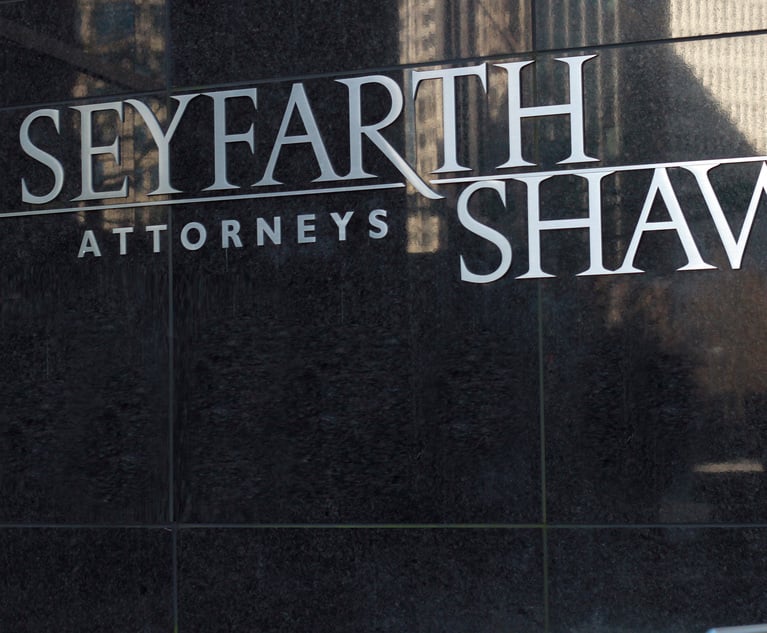 Photo: Shutterstock.com
Photo: Shutterstock.comLaw Firms Tackle Mental Health, One Initiative at a Time
Forty firms out of the Am Law 200 offered details on the steps they're taking to improve mental health and wellness among attorneys and staff.
June 17, 2019 at 07:00 PM
10 minute read
The original version of this story was published on Law.com
Long before the American Bar Association challenged the country's law firms last September to do more to support attorney mental health, legal industry experts had been sounding the alarm over high rates of depression, substance abuse and suicide in the profession.
Has Big Law answered the call?
Nine months after the ABA launched its program, the number of signatories has grown to over 90 law firms, in addition to more than 20 corporate law departments and law schools.
 These firms have agreed to follow a seven-point framework aimed at improving mental health and combating substance abuse, with measures such as increasing educational efforts, providing confidential access to experts and resources, and disrupting the centrality of alcohol at firm events.
These firms have agreed to follow a seven-point framework aimed at improving mental health and combating substance abuse, with measures such as increasing educational efforts, providing confidential access to experts and resources, and disrupting the centrality of alcohol at firm events.
This push followed growing evidence of a profession in crisis. A 2016 study published in the Journal of Addiction Medicine found that 21% of licensed, employed attorneys qualify as problem drinkers, 28% struggle with some level of depression, and 19% demonstrate symptoms of anxiety. Problem drinking, in particular, occurs at a far higher rate among lawyers than in the general population.
While a number of law firms already had programs in place, and others have responded to the ABA drive, their efforts are likely to collide with the deeply rooted ethos that lawyers, particularly in big firms, are expected to work onerous hours and keep the costs to themselves. Against that backdrop, there's fair grounds for concern that these efforts are little more than window dressing—a way for firms to check a box and show they are making a difference while avoiding the more complex process of a true reckoning.
To get a sense of what this new commitment to mental health outcomes actually looks like, at least on paper, Law.com surveyed every law firm in the Am Law 200. Forty responded, and of these firms, 27 also have their names on the ABA pledge. Tellingly, of those 40 respondents, only five came from outside of the Am Law 100.
While the mix of non-respondents likely includes firms that have active efforts to combat these issues, not one firm answered to say that they're not doing a thing about mental health and addiction. Those firms that are acting are, by and large, proud to share their efforts, and those firms that are proud to share are overwhelmingly bigger firms.
"The ongoing pressure to keep rates in check—that hasn't changed since the last recession. Margins are tight," said Marci Krufka Taylor, a law firm consultant and founder of Mantra Partner. "Small and midsize firms don't even invest in marketing and business development training."
|Comprehensive Initiatives
Over 20 firms that responded touted sweeping wellness initiatives. Many have branded these efforts, such as b.well@cooley, Thrive@Dechert, Akin Gump's Be Well, Reed Smith's Wellness Works and Thompson Knight's TKThrive.
Many of the programs include continuing legal education courses, along with other visiting speakers and online resources addressing stress and substance abuse made available through a firm's intranet or through custom-built apps. This meets with one of the points on the ABA framework, which asks firms to provide "enhanced and robust educational opportunities" over substance abuse and mental health issues.
Social opportunities promoting healthy lifestyles often appear as another piece of these initiatives. Take Dorsey & Whitney's Well Ahead, which encompasses officewide clubs ranging from knitting to running, and firmwide events like "bike to work week," or Reed Smith, which drew a connection between art and wellness and created a program encouraging employees to create and exhibit art, as well as view art in the firms' offices around the globe.
|Speakers
The firms that have elected to wrap their wellness efforts into umbrella programs and others who haven't taken this step often are relying on a familiar set of outside voices to impart lessons to their attorneys and staff. No fewer than nine firms brought in Patrick Krill, an attorney and licensed and board certified alcohol and drug counselor. Krill's popularity makes sense: He developed the seven-point framework on the ABA's well-being pledge.
Another attorney who's made multiple presentations is Lisa Smith, a Patterson Belknap Webb & Tyler professional who authored the recovery memoir "A Girl Walks Out of a Bar."
|Deemphasizing Alcohol
Another trend, one that maps onto another point on the ABA pledge, is recalibrating law firm events so that alcohol no longer sits at their center. A number of firms reported creating specialty "mocktails" for retreats and functions, often with attempts at clever names like the Dorsey nojito or Thompson Knight's Sloan Spritzer, titled after the firm's managing partner.
Firms are also changing terminology and imagery: at Cooley, for example, "cocktails and conversation" is out, as are pictures of martini glasses and champagne flutes when it comes to promoting events.
|Mindfulness and Meditation
A number of firms see mindfulness and mediation as one part of the answer to the stress that their lawyers are encountering.
Cooley is facilitating a "Mindfulness for Lawyers" training and giving all lawyers and staff who are interested a six-month subscription to a meditation app. Latham & Watkins has brought on outside vendor "The Potential Project" to offer a program at several offices around the world, with plans for expansion. On Meditation Mondays, Dechert employees are encouraged to step out of their roles for 30 minutes for a guided meditation led by a certified teacher.
Ideally, these measures work in concert to guard lawyers and staff against the worst stresses that the legal profession casts their way. A separate part of the same question involves what options these firms are offering to lawyers and staff who find themselves in crisis.
|Employee Assistance Programs
The majority of firms responding to our questionnaire indicated that attorneys and staff have access to help in times of relationship difficulties, addiction or financial stress, among other crises, though an employee assistance program provided by a third party vendor. The interactions with the counselors or experts provided by these programs can take a variety of forms: via phone, video-based counseling, online chatting, e-mail interactions or face to face.
Many of these programs also offer free self-assessment tools, in line with the ABA framework's focus on firms providing access to confidential addiction and mental health experts.
|Direct Access
Several firms have taken the step of ensuring that counselors are regularly available on site. Professionals behind Hogan Lovells' "Ask!" program—piloted in the firm's Washington, D.C., and New York offices in 2016 before being expanded to other offices including Baltimore, Denver, and Louisville, Kentucky—differs from common EAP programs, where those seeking help call in and talk for six sessions before they're referred to another counselor.
The firm has endeavored to ensure confidentiality for those who want to take advantage—administrators from HR and benefits are not in the loop. And apparently it's effective: Appointments fill up quickly. Akin Gump Strauss Hauer & Feld launched something similar in Washington, D.C. in 2018, bringing in an on-site behavioral assistance counselor from its EAP provider once a week, and it now is working to make someone available at each of its worldwide offices. Weil, Gotshal & Manges is aiming to the same in London with a psychotherapist, on a monthly basis.
|Mental Health First Aid
Some firms want their own attorneys and staff to be able to recognize and respond to their colleagues' struggles. They are undertaking efforts to have certain staff and attorneys be able to identify signs of depression, anxiety and substance abuse. Nixon Peabody provides mental health first aid training to all regional HR staff as well as certain office managing partners. Akin Gump is offering certification to lawyers and business services team members, with plans to expand to all firm personnel by the end of 2020. Dechert started in London with a group of seven, and now 50 attorneys and staff in the states have been trained.
|Who's in Charge?
One way to assess a firm's commitment to combating mental health issues is whether it has elected to pay someone a salary to address this matter, and nothing else. Considering the sweeping gulf in revenues and profitability that exists within the Am Law 200, this expense is easier for some firms to absorb than others—take deep-pocketed Kirkland & Ellis, which just hired its first firmwide director of well-being.
While it's obviously easier for larger firms to do so, not every big firm out there has taken the step. Overall, just 11 of the 40 firms responding have a full-time staffer overseeing its wellness efforts. Of those who do not, two respondents stand out: they've put a partner, rather than a non-lawyer professional, in charge of their wellness efforts.
All of these efforts add up to put law firms, and Big Law in particular, far ahead of where they were on the issue two decades earlier.
"It's easy to criticize them and say they're window dressing," Taylor said of these programs addressing mental health. "But just that fact that firms are devoting time and resources to it is a huge step forward."
She added that law firms remain 20 years behind corporate America when it comes to taking measures to improve mental health, with the goal not just to decrease stress, but increase creativity.
Sure, the underlying pressure imposed by the supremacy of the billable hour remains. But that should be no excuse for ignoring other release valves.
"As long as the inherent culture of law firms is one of performance at all costs, it is going to be difficult to effect meaningful change in terms of stress reduction and mental health for lawyers, but we have to try," Taylor said.
Krill, who had a key role in drafting the ABA pledge, came to a similar conclusion in a recent article for ALM.
"It is imperative that we don't allow our collective perfectionism or skepticism to become the enemy of the good by minimizing gains made, or by dismissing anything less than immediate and wholesale cultural overhaul as an unworthy failure, disingenuous lip service, or mere window-dressing on the profession's irredeemable flaws," he wrote.
Consequently, it seems fair to hope that the mid-sized firms that were, with some exceptions, silent during this exercise can find a way to follow the lead set by their larger cousins. These efforts won't magically solve the profession's mental health crisis, but they appear to be part of the path forward.
|Read More
Minds Over Matters: An Examination of Mental Health in the Legal Profession
This content has been archived. It is available through our partners, LexisNexis® and Bloomberg Law.
To view this content, please continue to their sites.
Not a Lexis Subscriber?
Subscribe Now
Not a Bloomberg Law Subscriber?
Subscribe Now
NOT FOR REPRINT
© 2025 ALM Global, LLC, All Rights Reserved. Request academic re-use from www.copyright.com. All other uses, submit a request to [email protected]. For more information visit Asset & Logo Licensing.
You Might Like
View All

New Year, New Am Law 100: Challenges Await These Newly Merged Law Firms
7 minute read
Trending Stories
- 1Restoring Trust in the Courts Starts in New York
- 2'Pull Back the Curtain': Ex-NFL Players Seek Discovery in Lawsuit Over League's Disability Plan
- 3Tensions Run High at Final Hearing Before Manhattan Congestion Pricing Takes Effect
- 4Improper Removal to Fed. Court Leads to $100K Bill for Blue Cross Blue Shield
- 5Michael Halpern, Beloved Key West Attorney, Dies at 72
Who Got The Work
Michael G. Bongiorno, Andrew Scott Dulberg and Elizabeth E. Driscoll from Wilmer Cutler Pickering Hale and Dorr have stepped in to represent Symbotic Inc., an A.I.-enabled technology platform that focuses on increasing supply chain efficiency, and other defendants in a pending shareholder derivative lawsuit. The case, filed Oct. 2 in Massachusetts District Court by the Brown Law Firm on behalf of Stephen Austen, accuses certain officers and directors of misleading investors in regard to Symbotic's potential for margin growth by failing to disclose that the company was not equipped to timely deploy its systems or manage expenses through project delays. The case, assigned to U.S. District Judge Nathaniel M. Gorton, is 1:24-cv-12522, Austen v. Cohen et al.
Who Got The Work
Edmund Polubinski and Marie Killmond of Davis Polk & Wardwell have entered appearances for data platform software development company MongoDB and other defendants in a pending shareholder derivative lawsuit. The action, filed Oct. 7 in New York Southern District Court by the Brown Law Firm, accuses the company's directors and/or officers of falsely expressing confidence in the company’s restructuring of its sales incentive plan and downplaying the severity of decreases in its upfront commitments. The case is 1:24-cv-07594, Roy v. Ittycheria et al.
Who Got The Work
Amy O. Bruchs and Kurt F. Ellison of Michael Best & Friedrich have entered appearances for Epic Systems Corp. in a pending employment discrimination lawsuit. The suit was filed Sept. 7 in Wisconsin Western District Court by Levine Eisberner LLC and Siri & Glimstad on behalf of a project manager who claims that he was wrongfully terminated after applying for a religious exemption to the defendant's COVID-19 vaccine mandate. The case, assigned to U.S. Magistrate Judge Anita Marie Boor, is 3:24-cv-00630, Secker, Nathan v. Epic Systems Corporation.
Who Got The Work
David X. Sullivan, Thomas J. Finn and Gregory A. Hall from McCarter & English have entered appearances for Sunrun Installation Services in a pending civil rights lawsuit. The complaint was filed Sept. 4 in Connecticut District Court by attorney Robert M. Berke on behalf of former employee George Edward Steins, who was arrested and charged with employing an unregistered home improvement salesperson. The complaint alleges that had Sunrun informed the Connecticut Department of Consumer Protection that the plaintiff's employment had ended in 2017 and that he no longer held Sunrun's home improvement contractor license, he would not have been hit with charges, which were dismissed in May 2024. The case, assigned to U.S. District Judge Jeffrey A. Meyer, is 3:24-cv-01423, Steins v. Sunrun, Inc. et al.
Who Got The Work
Greenberg Traurig shareholder Joshua L. Raskin has entered an appearance for boohoo.com UK Ltd. in a pending patent infringement lawsuit. The suit, filed Sept. 3 in Texas Eastern District Court by Rozier Hardt McDonough on behalf of Alto Dynamics, asserts five patents related to an online shopping platform. The case, assigned to U.S. District Judge Rodney Gilstrap, is 2:24-cv-00719, Alto Dynamics, LLC v. boohoo.com UK Limited.
Featured Firms
Law Offices of Gary Martin Hays & Associates, P.C.
(470) 294-1674
Law Offices of Mark E. Salomone
(857) 444-6468
Smith & Hassler
(713) 739-1250







